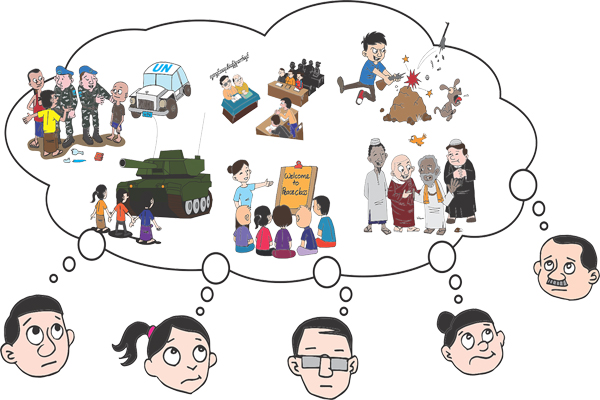Conflict resolution skills are not just important for professional facilitators, but actually also vital for anyone who is leading/managing diverse groups of people in both the community in social settings, as well as the business world. In this week’s guest column, facilitation experts Toby Berkman and Dan Egol explore why understanding identity is vital to successful conflict resolution in both community and workplace settings. They also provide advice on how to successfully manage complex public or workplace disputes based on research carried out by the Consensus Building Institute (CBI).
Imagine the following scenaro:
A white-haired, elderly woman approaches the microphone. “I’ve been going to this church for 50 years,” she says, her voice ringing through the hall. “Who exactly are you and why do you get to run the meeting? Are you even Catholic?” A series of murmurs from around the room suggest the woman is not alone in her skepticism.
The Catholic archdiocese has just informed the crowd of parishioners that it will be closing down their church to help the archdiocese balance its budget, and the mood is grim. The archdiocese brought you in as a dialogue consultant, to help it facilitate this and other difficult issues within the church. But this is your very first time facilitating a large public meeting in a professional context and you are extremely nervous.
Flustered, you hesitate, then finally muster up the courage to respond. “No, as it turns out I’m not Catholic. I’m Jewish, but I don’t think that’s really the point. I am not here to take sides. I’m just here to help manage this meeting and make sure everyone has a chance to contribute their perspective.”
This response seems to work well enough. The woman sits down, apparently satisfied. You exhale with relief and shift the conversation to the next item on the agenda. Still, you can’t help but feel a bit unsure of yourself. Was your response helpful? Or was it avoidant? Was it even a true and accurate description of your role? You just don’t know.
REFLECTING ON IDENTITY
The ‘you’ in this story is Toby Berkman, the co-author of this column, and a professional facilitator and mediator at CBI. A decade after this event, this moment is still on his mind, presenting an opportunity to reflect on the impact of a facilitator’s identity in complex public disputes and explore some challenging questions. For example:
- What is an appropriate response when one’s credibility as a facilitator is questioned based on a perceived facet of one’s identity, such as religion? Was it appropriate for Toby to suggest that his identity as a non-Catholic was not “really the point,” or did the role of his religion in this context deserve further exploration?
- What about other kinds of identities, such as Toby’s status as a newcomer to the community? Was his participation as an outsider a legitimate stakeholder concern?
- What might have been done to avoid and/or manage this situation more effectively?
- What are best practices for facilitators to navigate arenas where they may be perceived as outsiders based on elements of their identity, and for navigating questions of facilitator identity more generally?
WHY IDENTITY MATTERS
Whatever the answers to these questions, we believe that a facilitator’s various identities – both as understood by practitioners themselves and as experienced by others – complicate perceptions of facilitator authority, credibility, efficacy and neutrality in interesting and non-obvious ways. Although the example comes from a religious context, these dynamics and related questions are present not just in community spaces like places of worship, but also in our workplaces. They are important not just for professional facilitators, like the co-authors, but anyone who seeks to lead and manage groups. Honing our understanding of facilitation and identity is important for our professional endeavors as well as our civic participation as leaders in the community.

For our purposes here, we are defining identity as the social categories and attributes people use to answer the questions “Who are you?” and “What does it mean to be who you are?” Individuals have multiple identities reflecting the social categories or attributes they may use to answer these questions.
POWERFUL IMPLICATIONS
Social identity has been explored by many different fields, including sociology, anthropology, psychology, among others. Published literature from these fields has powerful implications for facilitators, organisations like CBI, and the dispute resolution field in general. This literature, when combined with our professional experience and that of our CBI colleagues, offers at least three broad categories of lessons related to identity that we believe to be particularly relevant for public dispute resolution practitioners and organisations. They include:
- Understanding and navigating identity through an ‘intersectional’ lens. For example, acknowledging how multiple identity characteristics intersect and create different lived experiences for both stakeholders and facilitators.
- Proactively and simultaneously tracking both our self-perceptions of identity and how we are identified by others.
- Acknowledging both lived and learned experiences as key components and perceptions of identity.
IDENTITY COMPLEXITIES
Overall, our conclusions highlight how critical it is to approach one’s identities as a facilitator with authenticity and transparency. This means being true to one’s various identities: reflecting beforehand on how one’s identities relate to the engagement at hand and whether this engagement feels authentic and credible. It can also mean being transparent with clients and stakeholders about these identities during meeting planning and facilitation: presenting yourself and disclosing elements of your identity honestly, ethically, and sometimes strategically, to build trust and decide whether moving forward with a particular engagement makes sense.
We suggest being clear about both how your identities may connect you to the problem at hand and where your limits may lie, and engaging in open and curious dialogue with clients and stakeholders about the implications. Our experience suggests that stakeholder perspectives on the relevance of a particular element of facilitator’s identity can vary greatly, and are not always predictable.
KEY LESSONS
In the church example above, Toby might have been better served by addressing the identity question much more openly from the outset of the meeting, preempting many stakeholder questions or concerns (while being open to any concerns that might still arise). During his introduction, Toby could have prepared a description of who he is and how his identities do (and do not) connect him to the problem at hand. For example:
“I haven’t experienced firsthand what it means to be part of this community, and I haven’t been part of a church that’s closing down. I won’t pretend I fully understand what you’re going through. I’m also not Catholic, although I do have a lot of admiration for its teachings and come from a community of faith of my own. What I do bring is experience working with communities that are facing difficult times, helping them think together about how to move forward, and an interest in listening and learning.”
AUTHENTIC ENGAGEMENT
This approach may sacrifice an element of facilitator neutrality. Indeed, it requires an open acknowledgment of where one’s blind spots and biases may lie, or where stakeholders may perceive them to lie. Our experience and those of our colleagues suggest this is a sacrifice well worth making in the interest of trust-building and facilitator credibility. Far from an admission of weakness, this kind of disclosure suggests the facilitator is comfortable in their own skin – confident in their abilities, not afraid of their limitations, and willing to expose themselves to challenges in the interest of creating the potential for greater group buy-in. It can also model to stakeholders the kind of authentic, respectful engagement we want to foster in our meetings.
We believe a facilitator’s identity is a factor in all processes whether or not it is expressly acknowledged. Effective facilitation thus requires raising our awareness around this reality, considering its impact, and addressing it with transparency, nuance and integrity.
Over the next few weeks, we will be posting our reflections and insights related to topics outlined in this article in a series of guest posts on fairplaytalks.com. Please let us know your thoughts on these topics. You can reach us at tberkman@cbi.org and dan.egol@inclusionnextwork.org.
For more information on this topic, check out the CBI’s website.
ABOUT THE AUTHORS

Toby Berkman is a Senior Associate at the Consensus Building Institute (CBI), where he designs and facilitates inclusive dialogue around difficult public and organisational issues.
Dan Egol is Co-Founder and Executive Director of Inclusion NextWork, a community of emerging leaders and organisations committed to Inclusion, Diversity, Equity, Accessibility and Social Justice (IDEAS). Check out his column on how to create fair leadership skills and leaders capable of cultivating a more equal workplace, society and world here.








































